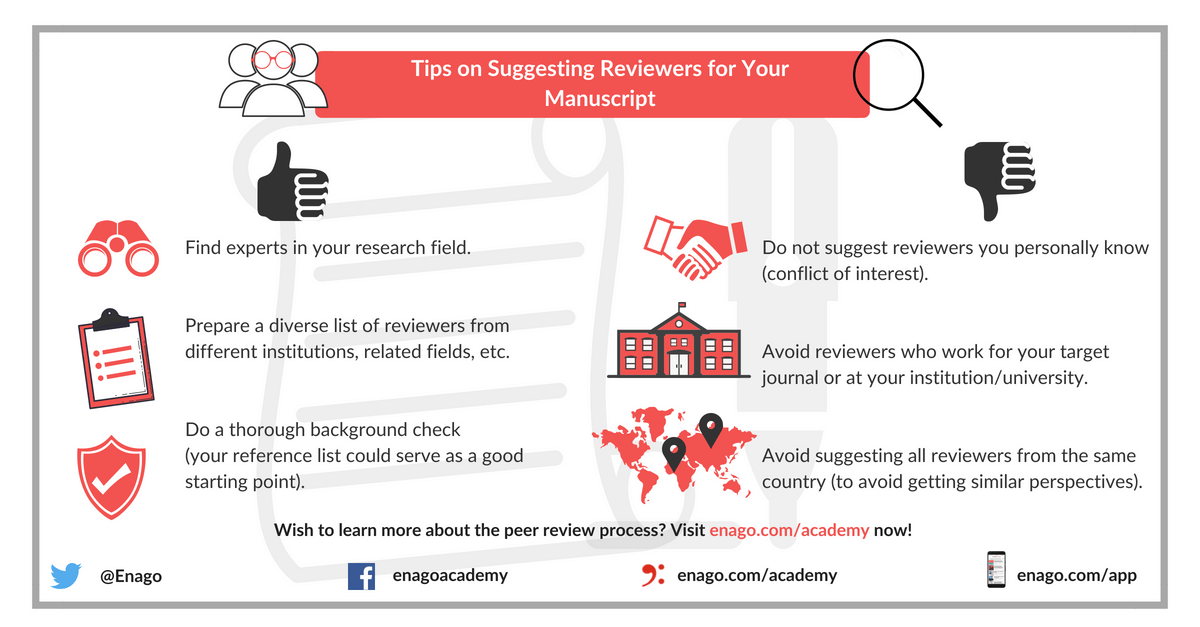How to Suggest Reviewers for Your Paper

The practice of suggesting peer reviewers by authors for their work is controversial. Peer review is a key part of the academic publishing process. Usually, qualified experts review submitted articles to check their quality and match for the journals. Usually, editors of the peer-reviewed journals choose these experts. The reviewer’s identity can be anonymous or disclosed depending on the journal’s policies.
Often journals require authors to suggest reviewers during the manuscript submission process. Potential reviewers are independent experts in your field of research. However, this practice can sometimes cause controversies and put authors in an ethical quandary.
Dos and Don’ts of Suggesting Reviewers
When you suggest peer reviewers for your work, you should stay unbiased. As scholars have noted, “An author-suggested peer reviewer choice might also tempt authors to seek experts who might be more receptive or sympathetic to the authors’ message or results, and thus favor the outcome of that paper.” But you should try not to fall into this trap.
Follow these tips to choose potential reviewers in an ethical way:
- DO explore the research field to find scholars who might want to review your work.
- DO give a diverse list of reviewers from different institutions, in different related fields, and with different points of view.
- DO ensure that your recommendations are experts in your field.
- DO take your time and be thorough when you make suggestions. Your reference list can be a starting point.
- DON’T suggest experts whom you know personally.
- DON’T list potential reviewers who work for your target journal.
- DON’T suggest reviewers because they will agree with your work.
- DON’T suggest reviewers who work at the same institution as you do.
- DON’T have all the reviewers from the same country. It is important to have a global perspective.
Above all, DO follow the journal’s guidelines for suggesting experts for your manuscript. Some journals do provide a list of requests for author suggestions (see this example from Energy & Fuels).
Related: Finished picking reviewers for your research paper? Read this article to learn more about how to reply to referee comments!
Pros and Cons of Author-Suggested Peer Reviewing
Why is author-suggested peer reviewing so controversial? Because even the most honest authors might suggest readers who will view their work favorably. At worst, it may open the door to fake peer review. In addition, the editor of a peer-reviewed journal may not disclose to the authors, the reviewers he or she has chosen. However, the reviewers still know that the author suggested them. This can influence the reviewer’s decision.
Research supports the problems with author-suggested peer review. Lutz Bornmann and Hans-Dieter Daniel published an article. They asked, “Do author-suggested reviewers rate submissions more favorably than editor-suggested reviewers?” The results were clear. Editor-suggested reviewers rated manuscripts between 30% and 42% less favorably than author-suggested reviewers did, indicating that author-suggested reviewers give better reviews.
Though author-suggested reviewing has some ethical issues, it has some advantages too. Suggesting your own readers might help your work find a home. Today, research fields are very complex. Every field has countless sub-fields. No one is an expert in every sub-field. So authors might know better how to choose experts in their sub-fields.
Moreover, author-suggested reviews allow editors to focus on other tasks in the publication process. For some journals, assigning peer reviewers means a huge time commitment, which can divert journal’s resources, affecting quality. Though some people would disagree with this point, it is one potential argument for author-suggested peer reviews.
Share Your Experience
The peer review process is getting more complex every day. Have you been asked to suggest peer reviewers for your own article? How did you handle the situation? Did you find it ethically questionable? What is your opinion of the author-suggested peer review process? Write to us in the comments to let us know!






enago academy is a good platform for new researchers to solve their confusions and to get required information on publishing research , finding relevant journals etc.